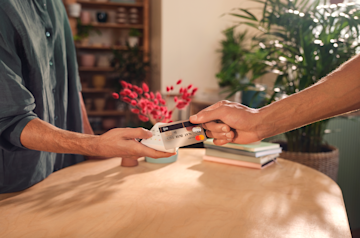
N26 x herMoney – How women can combat old-age poverty by investing early
Worried that it’s too late to get started with investing? Not so fast. Read on to learn why investing is so important, no matter when you get started.
4 min read
For far too long, prejudice and even discriminatory laws have made it a man’s domain to invest in stocks and securities. But the tide is changing, and women are quickly catching up when it comes to investing. And, with a variety of apps and click-to-buy products, investing is now easier than ever. There’s still a long way to go, though, and many people don’t feel empowered with enough knowledge to start investing—but this can have much bigger consequences. To learn more, we sat down with Anne E. Connelly, founder of herMoney, and talked about why old-age poverty impacts women the most and why it’s worth getting started with investing as soon as possible.Anne has been investing in and learning about the stock market for the last 30 years. She first discovered her passion for investing in the U.S., when she worked for an American investment company. Over the course of her career, she’s seen quite a few stock market cycles, and with that, plenty of different investment strategies.
We often hear the phrase “the earlier the better” when it comes to investing. Where do you stand on this? That’s correct. Women need to know that the time factor plays an extremely important role in investing. It’s a risk parameter designed to sit out volatile moments in the market—and, if necessary, to use those for future purchases. The longer you have for your ETFs or stocks to grow, the better. What’s your advice to women over 50 who are just now getting started with investing? It’s certainly not too late to get started at this age. A woman could have at least ten years until retirement and can use this time to save or invest. The important thing is to start getting familiar with the topic instead of going ahead impulsively. On herMoney, women can find tons of information about getting started—for example, with our free ETF beginner guide. Why do you think that so many women in Germany suffer from old-age poverty? And in your opinion, what needs to be done to fix this? The main reasons are that women often experience gaps in their professional lives, usually due to child-rearing or other care obligations, when they work part-time or not at all. Then, if someone goes through a separation or divorce, poverty in old-age becomes even more likely. That’s why it’s so important for women to maintain their jobs and negotiate fair financial compensation with their partners when they take time off for their families. If you were to give women over 50 one financial tip, what would it be? I’d say: educate yourself and start out by investing a small amount in an ETF to get some exposure to the stock market. Have you personally seen a shift in the finance world in terms of the presence and involvement of women? Women’s financial empowerment has changed a lot in the last few years, in part through social media trends. Now, there are a variety of offers out there that are specifically catered toward women. And in the finance world, much more attention is being paid to women in leadership positions. What do you think challenger banks can do to better help women become financially independent? There’s a lot that next-generation banks are already doing right. The visuals, color scheme, and general design of the advertisements are much more modern and speak to men and women of a younger generation. I’d say they need to make sure that more women work in their companies, especially in leadership roles. In a diverse environment, women’s needs are automatically more catered to. This is good for business and it’s good for women.
Shares, ETFs, and funds referred to in the article are always subject to risks. Information provided in the article does not constitute any form of investment advice or recommendation to buy or sell securities or other financial instruments. All information provided is for educational and illustrative purposes only and represents exclusively the opinion of the author. None of this information constitutes a recommendation for a particular investment strategy. Should the readers adopt the offered contents as their own, make use of any information, or follow any opinion referred to in the article, they act at their own risk.
We often hear the phrase “the earlier the better” when it comes to investing. Where do you stand on this? That’s correct. Women need to know that the time factor plays an extremely important role in investing. It’s a risk parameter designed to sit out volatile moments in the market—and, if necessary, to use those for future purchases. The longer you have for your ETFs or stocks to grow, the better. What’s your advice to women over 50 who are just now getting started with investing? It’s certainly not too late to get started at this age. A woman could have at least ten years until retirement and can use this time to save or invest. The important thing is to start getting familiar with the topic instead of going ahead impulsively. On herMoney, women can find tons of information about getting started—for example, with our free ETF beginner guide. Why do you think that so many women in Germany suffer from old-age poverty? And in your opinion, what needs to be done to fix this? The main reasons are that women often experience gaps in their professional lives, usually due to child-rearing or other care obligations, when they work part-time or not at all. Then, if someone goes through a separation or divorce, poverty in old-age becomes even more likely. That’s why it’s so important for women to maintain their jobs and negotiate fair financial compensation with their partners when they take time off for their families. If you were to give women over 50 one financial tip, what would it be? I’d say: educate yourself and start out by investing a small amount in an ETF to get some exposure to the stock market. Have you personally seen a shift in the finance world in terms of the presence and involvement of women? Women’s financial empowerment has changed a lot in the last few years, in part through social media trends. Now, there are a variety of offers out there that are specifically catered toward women. And in the finance world, much more attention is being paid to women in leadership positions. What do you think challenger banks can do to better help women become financially independent? There’s a lot that next-generation banks are already doing right. The visuals, color scheme, and general design of the advertisements are much more modern and speak to men and women of a younger generation. I’d say they need to make sure that more women work in their companies, especially in leadership roles. In a diverse environment, women’s needs are automatically more catered to. This is good for business and it’s good for women.
Shares, ETFs, and funds referred to in the article are always subject to risks. Information provided in the article does not constitute any form of investment advice or recommendation to buy or sell securities or other financial instruments. All information provided is for educational and illustrative purposes only and represents exclusively the opinion of the author. None of this information constitutes a recommendation for a particular investment strategy. Should the readers adopt the offered contents as their own, make use of any information, or follow any opinion referred to in the article, they act at their own risk.
Find similar stories
BY N26Love your bank
Related Post
These might also interest youLIFESTYLECould AI help you manage your money?86% of people are open to using AI for financial planning, but is it safe? Learn how AI is already transforming money management, and discover the pros and cons.
4 min read
LIFESTYLEUnderstanding tariffsFrom higher grocery bills, pricier electronics, and stock market swings, tariffs can impact your wallet and your investments.
5 min read
LIFESTYLEDe-hyping the no-spend challengeThis extreme challenge promises to transform your finances, but is it really the game-changer it claims to be?
4 min read


